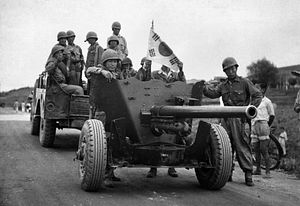Historian Andre Schmid, author of Korea Between Empires, likes to emphasize the fine line between national history and nationalist history. One kind of history maintains a cool and disinterested distance, the other instrumentalizes history, typically for the purpose of nation-building. It isn’t hard to imagine which kind of history one might find in state-produced history textbooks.
In a move likely to drive a deep wedge in society for some time to come, President Park Geun-hye, with uncertain but sufficient support from the ruling Saenuri Party, is endorsing the Ministry of Education’s plan to establish a single, state-produced history textbook system.* The reason, according to Park: “History education should not divide the citizens and students over political strife and ideological conflicts.” The implication is that a “correct” history can be taught.
There is also the issue of what many on the right see as a “pro-North Korean” bias in current textbooks. Saenuri chairperson, Kim Moo-sung, is not comfortable with the way North Korea’s “Juche idea,” a vague but foundational idea about national self-reliance, is taught in schools. Kim has made his thoughts publicly known, openly criticizing the way North Korea’s political system is taught and complaining about the influence “pro-North Korean forces” have on national history.
From 1974 until 2009, South Korea maintained such a state-controlled system. The production of history textbooks was only liberalized in 2010, when multiple textbooks were pre-approved by the government and some discretion given to middle and high schools over which textbook they would use. The move toward policy reversal began in 2013, after a history textbook written by so-called New Right scholars elicited protest from civic groups and scholars who thought the textbook whitewashed the colonial period and exonerated Park Chung-hee from dictatorial excess.
President Park’s decision to return to the old system can be read as a response to the history debates following the 2009 reform. Rather than take sides or attempt to mediate the debate, Park and her supporters simply want to stamp out debate entirely. Similar, perhaps, in the way a parent might respond to two siblings fighting over a toy — by taking the toy away.
An order from up high isn’t likely to resolve the history question in South Korea. The problem is that there is a deep, and probably insurmountable, divide between rightist and leftist national historiographies. When was Korea – as a modern nation – founded? During the countrywide protests in the spring of 1919, better known as the March 1st Movement, or at the time of the republic’s founding in 1948? Should the complexity of Japanese collaboration be understood or outright dismissed? Should Park Chung-hee be favorably “remembered” or heavily criticized? And what about North Korea? Should students learn about Kim Il-sung and his Juche ideology? If so, how? These are a few of the questions and issues that divide scholars and politicians – i.e., those most responsible for building and maintaining the nation.
And divided it has. Since Park’s request to the Ministry of Education, the issue has been fully politicized, forcing politicians in particular to make their positions known. As one article from the Chosun Ilbo shows, the textbook issue has become a political battlefield, with each side lobbing rhetorical bombshells. Outside the National Assembly, things are a little different. Most professors, it would appear, and even several of the members of the National Institute for Korean History (the “control tower” for the writing of the new state textbook, as JTBC puts it) oppose (re)nationalizing history textbook production. The issue, as covered by Christopher Green, has even succeeded in uniting Korea’s usually rigidly divided news media in opposition to Park’s plan.
As for the electorate, the issue more or less divides Korea down the middle – no doubt an effect of its politicization. As reported in the Hankyoreh, “An October 14 survey by Money Today and Real Meter showed 47.6 percent of respondents supporting the designated textbooks and 44.7 percent opposing them.” Whether the numbers change much as the debate wears on is an open question, but it seems unlikely given that history is a clear wedge issue. With the history issue so polarized, main opposition chairperson Moon Jae-in raised a fair point when he asked, “If we start with state history textbooks, wouldn’t it change after every change of government?”
Yes, Moon is probably correct. And he’d likely be the first in line to change the textbook were he and his liberal-progressive National Politics Alliance for Democracy to take control of government in the next presidential election. Moon is as interested in instrumentalizing history as any other political elite.
*An update was made to clarify the origin of the plan.

































